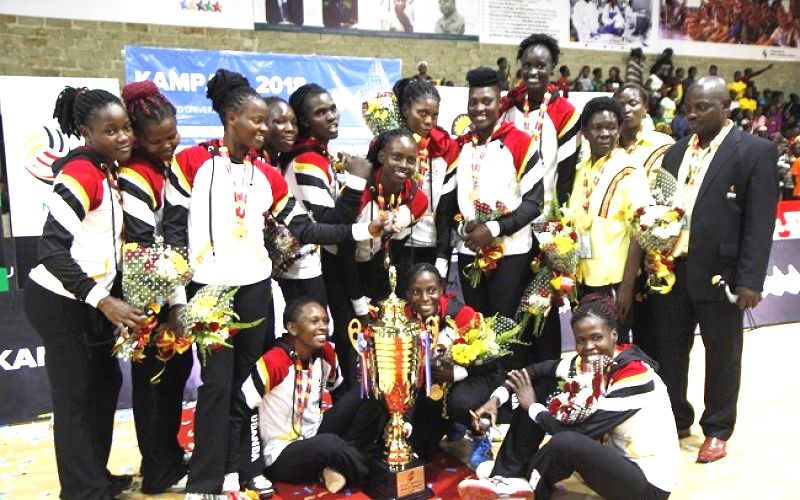As soon as the final whistle was blown, jubilations and celebrations erupted among Ugandans who had come to cheer the Mighty Cranes during the final match of the 3rd World University Netball Championship. Hosts Uganda beat defending Champions South Africa 44-43 in the highly anticipated, hotly competitive Final Game.
The FISU World University Netball Championship which started on Monday, 17th September ended blissfully for Uganda on Friday, 21st September 2018 with the triumphant hosts lifting the trophy. The Championship attracted six other countries including USA, Singapore, Sri Lanka, Zimbabwe, Kenya and South Africa.

During the closing ceremony that was held in the Makerere University Sports Arena, a jovial Prime Minister of the Republic of Uganda Rt. Hon. Dr. Ruhakana Rugunda, congratulated the Mighty Cranes upon their historic victory. He also commended South Africa for putting up a defensive game and Singapore for emerging third in the 2018 Championship.
“I also thank the delegations from the six countries namely; Kenya, Singapore, South Africa, Sri Lanka, USA and Zimbabwe for accepting our invitation. I thank the International University Sports Federation (FISU) for entrusting the Republic of Uganda and Makerere University with hosting the 2018 Championship,” he said.
The Prime Minister appreciated the Ministry of Education and Sports, the leadership of Makerere University, partners, event sponsors and the Uganda Police Force (UPF) for ensuring that a successful event was held. He also thanked the Uganda Peoples Defence Forces (UPDF) and the Engineering Brigade in particular for ensuring that the sports facility was ready for the Championship.

According to Dr. Ruhakana Rugunda, sport is an important tool for promoting unity and team spirit. It is a discipline that teaches people to live harmoniously and peacefully in societies. He therefore called upon students to exhibit their talents and also promote their universities and Uganda at large through sports.
“I can attest to the fact that sports can be played alongside academics. For years, the Government of Uganda through the Ministry of Education and Sports has supported students a with a sports talent to pursue education in the respective universities,” he said.
The Vice Chancellor of Makerere University Prof. Barnabas Nawangwe congratulated the Mighty Cranes upon the well-deserved victory. In the same spirit he commended all participants for their energetic performances.

“Throughout this Championship, I noted that all participants put up spirited, skillful and professional performances. I therefore appreciate the heads of delegation, managers, coaches and sports tutors of the respective teams for a job well done,” said the Vice Chancellor.
“In a special way allow me to thank Team Uganda; The Mighty Cranes, for the passion and professionalism they have exhibited throughout the games. You have dearly defended and promoted the netball brand of Uganda and our respective universities. Your talent and creative play has endeared us to other countries as experts in netball. Thank you so much!” he added.
Prof. Nawangwe commended the professional conduct of the 2018 Championship referees and the technical team, the efforts of the Local organizing committee and the volunteers that guaranteed the smooth running of the games. He as well applauded the UPDF Engineering Brigade for constructing a world class indoor sports facility as a befitting legacy to the event.

He thanked the Government of Uganda and in particular the H.E Yoweri Kaguta Museveni and the Minister of Education and Sports Hon. Janet Kataaha Museveni for extending support worth UGX5.57billion to the construction of the Makerere University Arena.
“On behalf of FISU and sister members, I appreciate the hosts, the international and local organizing committees, the coaches, players and volunteers for the job well done. This game ended with excitement. As the FISU President, it gives me great pride and joy to say that we have successfully held the 3rd FISU World University Netball Championship 2018. Webale Uganda, webale Makerere University,” said Mr. Liberty Maidza, the FISU President’s representative.
The closing ceremony climaxed with a grand dinner at Imperial Royale Hotel.
#WUNC2018Kampala
Article by Mak Public Relations Office


 General12 hours ago
General12 hours ago
 General12 hours ago
General12 hours ago
 Humanities & Social Sciences1 week ago
Humanities & Social Sciences1 week ago
 General1 week ago
General1 week ago
 Agriculture & Environment2 weeks ago
Agriculture & Environment2 weeks ago






